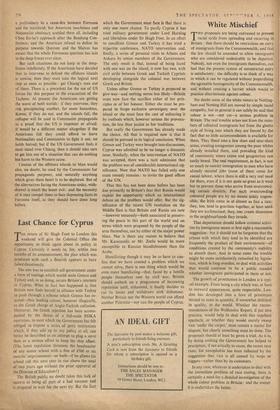Last Chance for Cyprus
rr HE return of Sir Hugh Foot to London this weekend will give the Colonial Office the opportunity to think again about its policy in Cyprus. Certainly it needs to, for, within two months of its announcement, the plan which was produced with such a flourish appears to have failed disastrously.
The aim was to establish self-government under a form of tutelage which would unite Greece and Turkey and, in so doing, secure Britain's interests in Cyprus. What in fact has happened is that Britain now finds herself in alliance with Turkey to push through a scheme which Greece has re- jected—thus lending colour, however illogically, to the Greek charge of Anglo-Turkish collusion. Moreover, the Greek rejection has been accom- panied by the threat of a full-scale EOKA operation, to meet which the Government has felt obliged to impose a series of petty restrictions which, if they add up to any policy at all, can better be described as an attempt to plug a sieve than as a serious effort to keep the ship afloat. (The latest regulation threatens the headmaster of any senior school with a fine of £500 or six months' imprisonment—or both—if he allows his school roll this next year to rise above the total of two years ago without the prior approval of the Director of Education!) The British public no doubt takes this lack of success as being all part of a bad summer and is prepared to wait for the next try. But the fact which the Government must face is that there is only one more chance. To pacify Cyprus it has tried military government under Lord Harding and liberalism under Sir Hugh Foot. In an.effort to conciliate Greece and Turkey it has tried a tripartite conference, NATO intervention and, finally, a series of personal visits to Athens and Ankara by senior members of the Government. The only result is that, instead of being faced with one war on the island, it now has two, with civil strife between Greek and Turkish Cypriots developing alongside the colonial war between Greek and British.
Unless either Greece or Turkey is prepared to give. way—and nothing seems less likely—Britain must now face the sacrifice either of her prin- ciples or of her honour. Either she must be pre- pared to forgo exclusive sovereignty over the island or she must face the cost of enforcing it by methods which, however serious the provoca- tion, do less than justice to her traditions.
But really the Government has already made the choice. All that is required now is that it should be pursued to its logical conclusion. When Greece and Turkey were brought into discussions, Cyprus was admitted to be no longer a domestic issue. Similarly, when the intervention of NATO was accepted, there was a tacit admission that the problem was of considerable international sig- nificance. Now that NATO has failed only one more remedy remains : to invite the good offices of the UN.
That this has not been done before has been due primarily to Britain's fear that Russia would exploit the opportunity which an international debate on the problem would offer. But the sig- nificance of the recent UN resolution on the Middle East is that Britain and Russia are now —however tenuously—both associated in preserv- ing the peace in this part of the world and on terms which were proposed by the people of the area themselves, not by either of the major power blocs. Nor is there any reason to believe that Mr. Karamanlis or Mr. Zorlu would be more susceptible to Russian blandishments than the Arabs.
Humiliating though it may be to have to con- fess that we have created a problem which we cannot solve, there is one thing which would be even more humiliating—that, faced by a hostile people themselves rent by civil war, Britain should embark on a programme of increasing repression until, exhausted, it finally decides to cut its losses and withdraws with dishonour.
Neither Britain nor the Western world can afford another Palestine—nor can the people of Cyprus.


































 Previous page
Previous page